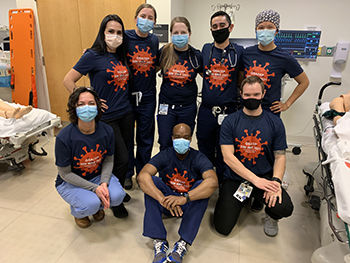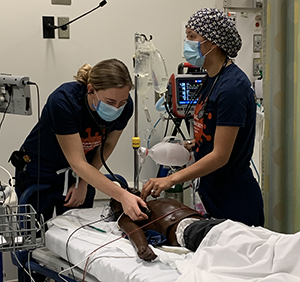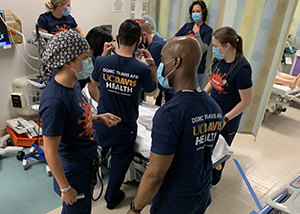Emergency physicians in military residency programs are no strangers to treating patients on the battlefield, but this week residents at UC Davis Health and throughout the country went head-to-head in a unique battle of clinical skills called the SimWars.
 The team representing UC Davis Health comprised Air Force service members from UC Davis Health and the David Grant Medical Center.
The team representing UC Davis Health comprised Air Force service members from UC Davis Health and the David Grant Medical Center.
During the competition, teams of residents put their medical knowledge, decision-making skills and military experience to the test through a series of surprise simulation scenarios, using mannequins with advanced lifelike physiology. They are judged by a panel of experts from the U.S. Army, Navy and Air Force on how well they manage combat casualties and critically ill simulated patients.
Air Force Lt. Col. Roderick Fontenette, a military emergency medicine physician at UC Davis Health, brought the event to the health system for the first time this year. The competition is part of the annual Government Services Symposium facilitated by the Government Services Chapter of the American College of Emergency Physicians (GSACEP) – an organization devoted to supporting emergency medicine physicians with unique practice situations encountered by active duty, National Guard, and Reserve members, as well as physicians in federal service in the Veterans Administration, Indian Health Service, Department of Health and Human Services and Public Health Service.
"The SimWars competition highlights our military emergency medicine residency programs and focuses on care provided to service members that begins at the initial point of injury and spans the entire en route care system," Fontenette said. "Participating residents are from the Army, Navy and Air Force and highlight the interservice collaboration between the medical corps of the three branches, allowing us to train how we fight."
Assembling teams to compete
SimWars results
First place: UC Davis Health
Second place: Medical College of Georgia (Army)
Third place: Navy Medical Center San Diego (Navy)
This year more than 30 residents competed from seven programs across the nation. Teams included service members from:
- Air Force – University Medical Center/Nellis Air Force Base and David Grant USAF Medical Center/UC Davis Health
- Army – Madigan Army Medical Center, San Antonio Military Medical Consortium and the Medical College of Georgia
- Navy – Naval Medical Center San Diego and Charlotte Medical Center
Logistics during the pandemic
In years past, the SimWars took place on a stage in front of a live audience of conference goers – except for the 2020 conference which was canceled entirely due to the coronavirus.

Two military emergency medicine residents work to treat a simulated pediatric patient with severe asthma.
This year, the conference is virtual and the simulation scenarios were sent to team leaders at their home institutions and kept top secret until it was time to film the sessions for later viewing during the conference. The recorded sessions were sent to a simulation committee, who showed them via a conference livestream on April 8.
Fontenette said this is the first time the organization has held a virtual simulation competition, which posed many challenges for participants, but that the video streaming process was successful.
"We held debriefing sessions between each round to reinforce key teaching points and lessons learned, and then the winners of each round were announced with the UC Davis Health team being crowned the ultimate winner of the SimWars competition," Fontenette said. "Hopefully we'll be doing this in person next year, but the process went smoothly given we're in the midst of the pandemic."
Retired Air Force Col. Max Lee, a member of the GSACEP board of directors, agreed.
"Undaunted, the creativity and zeal for competition focused the efforts of our residents and faculty to think and act collaboratively in finding innovative solutions," Lee said. "Their SimWars experiences in fielding this virtual competition will be something they can draw from when working in the hospitals and on the battlefield."
Making it realistic

Military emergency medicine residents work together during the recording of their SimWars entry.
Donning matching T-shirts, the UC Davis Health residents filmed their entry on February 12 in the UC Davis Center for Simulation and Education Enhancement. Led by Fontenette and simulation center faculty and staff, the residents cared for four patients, two at a time, with conditions including an acute traumatic brain injury, severe pediatric asthma, acute hemorrhagic shock and peri-arrest due to a gunshot wound.
Ian Julie, associate professor of emergency medicine and medical director for the simulation center, said scenarios are made to look and feel as real as possible, employing the use of simulated blood and moulage – a type of makeup artistry used to create mock wounds and visible physical symptoms of illness.
"We have volunteers playing the part of concerned service members and of course our high-fidelity mannequins are there providing real-time information such as heart rate, oxygen levels, blood pressure and other vital signs," Julie said. "It's about as close as you can get to a real-life situation, but safe and reproducible at multiple sites."
Thanks to the work done at the beginning of the pandemic to move simulation education classes online, the team was easily able to record the sessions for Fontenette using Zoom-enabled workstations on wheels and the center's in-room video cameras.
"This was so much fun," said Air Force Capt. Laura Jabczenski, a postgraduate year two military emergency medicine resident at UC Davis Health. "I am looking forward to more training like this in the future."






